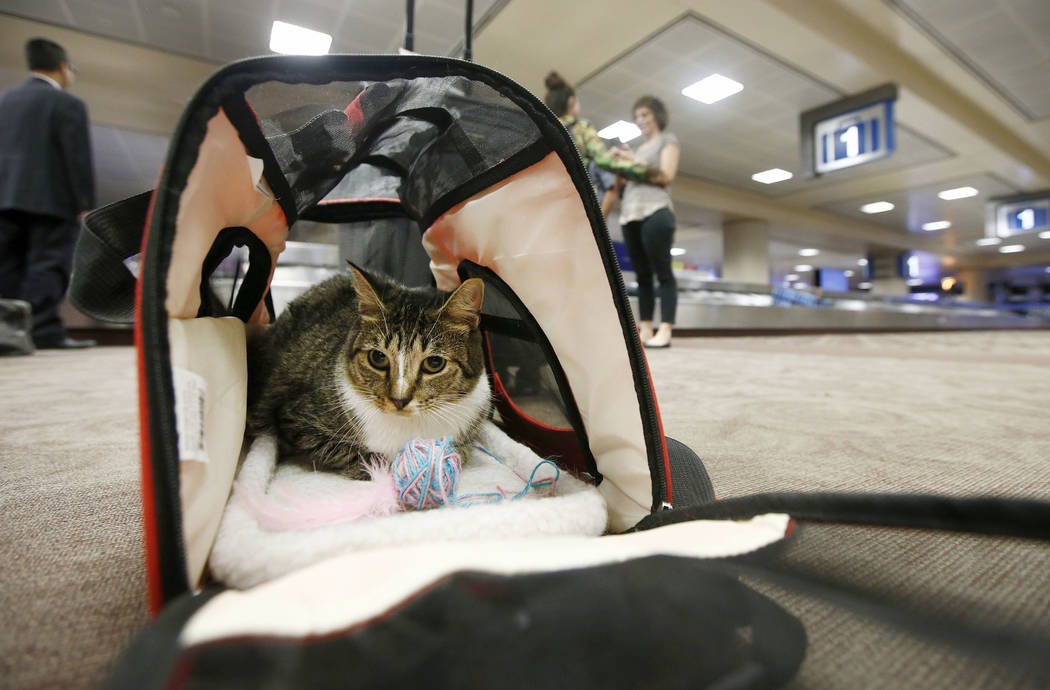Federal officials consider tighter rules for pets on planes
The U.S. Department of Transportation could soon tighten the rules for animals traveling on airplanes.
The department announced this week that it is seeking public comment on proposed amendments to its Air Carrier Access Act (ACAA) regulation on the transport of service animals. Officials are looking at animal owners who abuse their pets’ designation as emotional support animals, which differ from service animals.
Service animals and emotional support animals currently fly on planes for free; airlines charge a pet fee to transport other animals.
Only dogs that have undergone specific training can be identified as service animals. On the other hand, a therapist can deem any pet an emotional support animal, and no training for the animal is required.
The proposal “addresses concerns raised by individuals with disabilities, airlines, flight attendants, airports, other aviation transportation stakeholders, and other members of the public, regarding service animals on aircraft,” the department said in a news release. “The department recognizes the integral role that service animals play in the lives of many individuals with disabilities and wants to ensure that individuals with disabilities can continue using their service animals while also reducing the likelihood that passengers wishing to travel with their pets on aircraft will be able to falsely claim their pets are service animals.”
McCarran International Airport had a notable problem with an emotional support animal in 2016, when a monkey on a Las Vegas-bound Frontier Airlines flight from Ohio caused a stir in the cabin.
The monkey’s owner had documentation certifying it as an emotional support animal, but the animal reportedly got loose during the flight. No injuries were reported, but the owner was placed on Frontier’s no-fly list and had to book a flight with another airline to get home.
The proposed amendments would:
— No longer require airlines to treat emotional support animals as service animals.
— Define a service animal as a dog individually trained to do work or perform tasks for the benefit of a person with a disability.
— Require the same training and treatment for psychiatric service animals as for other service animals.
— Allow airlines to require a service animal’s owner to have forms developed by the Department of Transportation attesting to the animal’s behavior, health and (for long flights) ability to relieve itself in a sanitary manner or wait until the flight is over.
— Allow airlines to require disabled passengers traveling with service animals to check in at the airport one hour before other passengers.
— Allow airlines to limit the number of service animals traveling with a single passenger to two and to require a service animal to fit within its handler’s foot space on the aircraft.
Airlines would still be allowed to:
— Require that service animals be harnessed or otherwise under the owner’s control.
— Refuse transportation to service animals that exhibit aggressive behavior and pose a threat to passengers’ health or safety.
Under the proposal, airlines would still be prohibited from refusing to transport a service animal solely on the basis of its breed.
According to the Humane Society’s website, animals that don’t qualify as a service animal can fly for a fee, but accommodations must be made in advance with the airline to ensure the animal meets the size requirements.
Most airlines require a nonservice animal to fly in a kennel and under the seat in front of the passenger for the entire flight. The kennel is generally considered a carry-on item.
McCarran spokeswoman Christine Crews said that even though service animal dealings are between passengers and individual airlines, the airport will adhere to any federal guidelines.
The airport has indoor and outdoor areas where passengers can take their pets to relieve themselves, Crews said.
“We understand that there is a need and a desire for people to travel with their pets,” she said. “So we will continue to support amenities to support those travelers. However, these changes would have more of an impact between the relationship between the passenger and an airline, more so than a passenger and the airport.”
The proposed amendments can be found at regulations.gov, docket number DOT-OST-2018-0068. Comments must be received by March 22.
Contact Mick Akers at makers@reviewjournal.com or 702-387-2920. Follow @mickakers on Twitter.


















